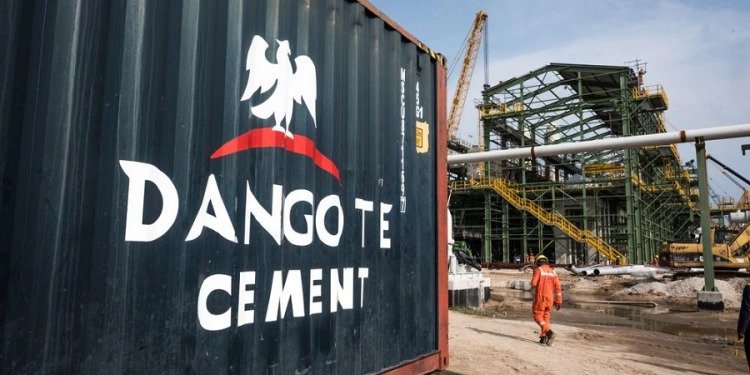Why the Nigerian government is seizing a cement plant from Aliko Dangote

Africa’s richest man, Aliko Dangote is in a tussle with the government in Kogi state, northcentral Nigeria over the ownership of one of his cement plants located in the Obajana area of the state.
The state government is a report from the Specialized Technical Committee on the Evaluation of the Legality of the Alleged Acquisition of Obajana Cement Company Plc by Dangote Cement Company Limited said the claimed transfer of Obajana to Dangote Industries Limited was “invalid, null and void.”
The report claimed that the certificate of occupancy of the company was solely owned by the state government and that “Kogi State Government should take steps to recover all accrued dividends from profits made over the years, including accrued interest on the same.
“Kogi State Government should take steps to cancel the existing seven Certificates of Occupancy in the name of Dangote Cement Company.”
“Agreement between Kogi State Government of Nigeria and Dangote Industries Limited, dated 30th July 2002 and supplemental agreement dated 14th February 2003, as contained in Exhibit 71 of the Judicial Commission of Inquiry Report, purporting the transfer of Obajana Cement Company Plc to Dangote Industries Limited, are all invalid, null and void.
“There is no evidence of consideration paid by Dangote Industries Limited to Kogi State Government from the alleged transfer of Obajana Cement Company Plc and no dividend was paid to the state from the profits realised from the inception of Dangote Cement Company Plc to date.”
On his part, the Speaker of the Kogi State House of Assembly, Matthew Kolawole, said the acquisition of the Obajana Cement Company by Dangote was without the resolution of the House of Assembly, which rendered the process null and void.
“It is clear that you cannot sell a state government property of any form without the resolution of the Kogi State House of Assembly.
“All the transfer process of the share capital to Dangote from Obajana by the previous administration was without any law backing it by the state House of Assembly,” Kolawole stated.
What Dangote is saying

On its part, the management of Dangote Cement Plc has in its reaction to the shutdown of its plant at Obajana by the Kogi State Government, appealed to all its staff and customers to remain calm while the company explores all possible legal steps to address the action by the government which it described as illegal.
A statement issued from the company’s headquarters in Lagos reads,
“The management of Dangote Cement Plc, wishes to inform members of the public, especially its customers and other stakeholders of the recent invasion of its Obajana Cement Plant, Kogi by armed vigilantes on the orders of the state government.
“The vigilantes, led by some officials of the state government were apparently acting on a resolution of the Kogi state House of Assembly on controversial tax claims.
“Claims that the state governor had also contradicted when he said the shutdown was due to an alleged invalid acquisition of the company by Dangote Industries Ltd.
“In the process of forcefully evicting the workers to enforce the shutdown, the vigilantes shot at 27 of our workers and also destroyed some of the company’s property at the plant.
“While we reiterate that Obajana Cement plant is 100 percent owned by Dangote Cement PLC, we remain resolute in transforming Africa, while creating sustainable value for our people, communities, investors, and customers.’’
What the Obajana seizure means for investors in Africa
Aliko Dangote the businessman and President of the Group is no doubt one of the biggest investors in Africa with investments across multiple African countries including Nigeria, Kenya, Tanzania, and South Africa. The billionaire has demonstrated a remarkable commitment to investing in Africa, and the Obajana Cement plant is one of them.
The forceful closure of the plant which has provided jobs to the youth, revenue to the Kogi State government, and infrastructure for the people is an unfortunate chapter in Nigeria’s polity.
At a time that the continent of Africa is fast-tracking the ‘AFCFTA’ which is the Free Trade Agreement Area, designed to boost industrialization, trade, and development the actions of the Kogi state government are shocking.
For the benefit of the doubt, Nigeria is a democratic state, and where there are issues of concern around the operations of a multinational in a state.
There are four reasons why the recent action of the Kogi state government on the Obajana Cement plant, speaks to the effect of signaling to investors.
- Ease of Doing Business
Part of the role of government at the federal, state, or local government level is providing an enabling environment for businesses to thrive.
The actions of Kogi State undermine this and create a hostile environment for businesses. - Investment Promotion
Nigeria is doing well in the area of attracting foreign direct investments, which was below $500m in Q2,2022. This current action could create additional shocks for potential foreign investors, who will be worried at the treatment meted out to a major domestic investor. - Sanctity of Contracts
It will raise the fundamental question of how Nigeria regards the sanctity of contracts and engagements.
If there are issues like the Manufacturers Association of Nigeria raised, then the best way to approach it is going through the courts. The laws of engagement should be respected without which investors will develop cold feet for investing in Nigeria. - Security of Assets
Prior to this incident, Kogi State was highly rated for security whether for assets or communities. With reports that people were shot during the forceful closure, efforts must be made by the government to resolve the issues amicably and bring back stability to the state.
